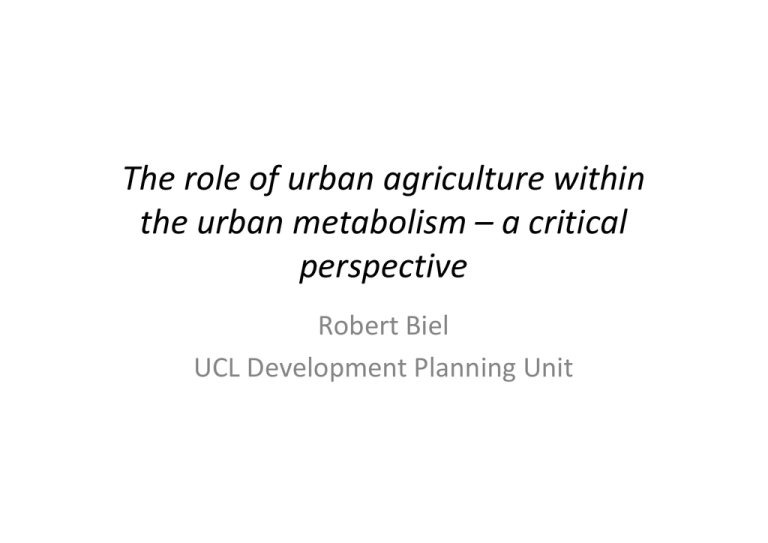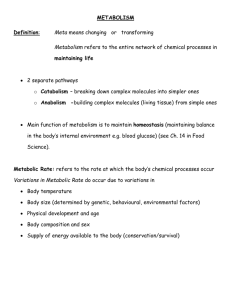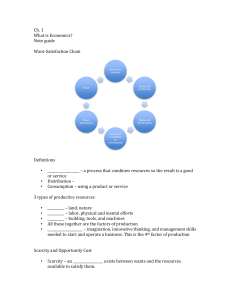The role of urban agriculture within perspective Robert Biel
advertisement

The role of urban agriculture within the urban metabolism – a critical perspective Robert Biel UCL Development Planning Unit THEORY Water poverty is not the same as scarcity Entitlements argument (Sen 1982) , as counter to Malthusian assertion that poverty derives from scarcity As with food, water poverty can therefore undoubtedly exist even in a context of plenty The blockage is thus not absolute supply, but rather limitations in governance, distribution etc. Nevertheless, there is a strong argument that water may be becoming objectively scarce (Marks 2007) ... for many reasons, including industrial demands on water ... most recent developments arguably attempt to stave off entropy at the expense of increased intensity of water use, e.g. semiconductor industry (Williams et al 2002) or in context of Peak Oil (Lydersen 2007) But most importantly for our purposes, the problem is related to food scarcity/crisis ... because ... ... food is embodied water You consume about 1000x as much water through your food as the water you drink ... roughly one litre of water for each calorie (FAO 2009) This poses severe constraints, which from one angle can be addressed at the institutional/governance level (Molden and de Fraiture 2004) But the other necessary angle is ... ... change in agricultural methods! TOWARDS A NEW FARMING SYSTEM some of the unsustainably high water consumption undoubtedly results from failings of the mainstream food system: ... high input ... not just of energy and of chemicals, but of water e.g. effect of Green Revolution lowering water tables is well documented (Buchholz 1984) ORGANIC CRITIQUE Key to everything is maintaining soil structure (Howard 1943) we thereby minimise not only demands on water input but leaching of nutrients by water throughput it is possible to aspire to a viable agriculture which focuses mainly on the harvesting and flow of water ... as in the case of Zimbabwean farmer Zephania Phiri Maseko (Lancaster 1996) CRISIS AS TRIGGER FOR ADAPTATION The political economy enters a phase which is chaotic, but also one of opportunity (Biel, forthcoming) This crisis triggers some kind of reflex, but what kind? On the Malthusian premise, the response would be conflictual, but this is not necessarily true ... ... it can be a co-operative reflex Co-operation and regime solutions are perfectly compatible with both game theory and evolutionary models (Nowak 2006) Research now reveals how crowds, far from ‘stampeding’ in an irrational manner, tend to increase their co-operative and rational behaviour in situations of stress or danger (Bond 2009; Winn 2009) This can apply very well to water. In researching a book on ‘water wars’, when Wendy Barnaby found that co-operative responses to water scarcity overwhelmingly prevail over the conflictual, her publishers cancelled their interest (Barnaby 2009) This confirms a lot of previous research on ‘water wars’ (Wolf 1999, Alam 2002). While most of this literature is in the IR field, but there is a strong hypothesis that this would be reflected in local resource management too STRUGGLE Although internecine conflict is less than one might think, there is undoubtedly a defensive struggle against attempt by powerful interests to ‘grab’ water When in El Salvador, decentralisation became an excuse to privatise it, people protesting this were accused under an anti-terror law (Cispes 2007) ... but I don’t think this will succeed in suppressing struggle c.f. Cochabamba Water Revolt in Bolivia from 2000, againstWorld Bank attempts to ‘privatise’ water in the interest of the US Bechtel corporation; or the failure Enron’s 1998 attempt to launch internet speculative water economy via its subsidiary Azurix URBAN CONTEXT: METABOLISM “cities as hybrid phenomena that emerge from the interactions between human and ecological processes.” (Alberti 2008: 6) ; they are therefore complex, multiequilibria systems which do not follow a single trajectory to a single point of equilibrium ... interface between natural systems and social/institutional ones Water can be regarded as an important means of transmission within this metabolism ... but that’s only a general proposition: we must strive to understand it concretely CONSERVING WATER IN URBAN AGRICULTURE ... achieved through a combination of mulches and green manures phacelia tanacetifolia Hypothesis is that by use of similar sustainable methods, rainwater should suffice ... this is confirmed by some recent research (e.g. Veríssimo 2010) In this hypothesis, the more successful the conversion to low-input methods, the more selfcontained the plot, from a water viewpoint (the same would apply to other inputs) ... this provides a brilliant defence against water poverty ... ... but does it weaken insertion of urban agriculture in the metabolism? We would have to seek the answer by looking somewhere around the diversity of forms of urban agriculture; it is perfectly OK for some forms to be more self-sufficient and others more strongly interdependent with other parts of the metabolism In order for urban agriculture to make a serious contribution to the goal of ‘cities feeding people’, it must include certain organisational forms where the production is far higher than the food needs of the people engaged in it ... the metabolism insertion of such high-productivity would be far higher than for the subsistence sector Example: the Will Allen model Allen’s model probably functions to some extent as a closed-loop system, inasmuch as the salad crops act to purify the water in a manner analogous to river plants: even Allen was surprised to learn that the system spontaneously developed a state of equilibrium in this respect At the same time, insertion in social networks is very high... CONCLUSION It is possible as part of a diverse approach to include certain forms which intensively make use of those resources (grey water, also compostable waste etc.) which are available within the urban system ... this may be achieved through an extension of the industrial ecology model. Just because it is not subsistence based, this high-productivity department of urban agriculture necessarily fosters distribution and social networks These resources are nevertheless drawn into smallscale loops within the individual project, while at the same time fostering wider loops at the community, district or city level


